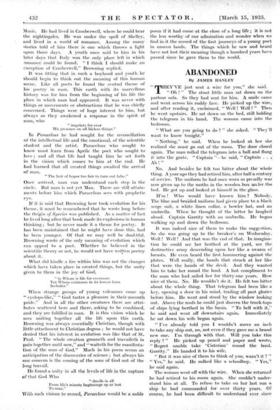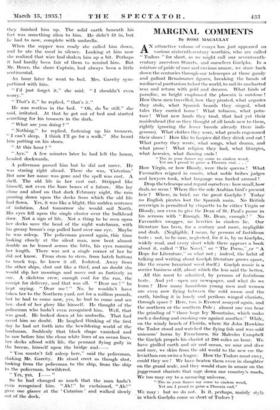ABANDONED
By JAMES HANLEY
" THEY'VE just sent a wire for you," she. said. " .0h ! " The stout little man sat down on the parlour sofa. So they had sent for him: A smile came and went across his ruddy face. He picked up the wire, and after reading it, exclaimed, " Well ! Well ! " Then he went upstairs. He sat down on the bed, still holding the telegram in his hand. The woman came into the bedroom.
"What are you going to. do ? " she asked, "They'll want to know tonight."
"Nothing," he said. When he looked at her she realized she must go out of the room. The door closed again. The man rolled the telegram into a ball and flung it into the grate. "captain "—he said, "Captain . . -4! Ali!"
No. And besides he felt too bitter about the- whole thing. A year ago they had retired him, after half a century of service. The uniform he had once worn so proudly was now given up to the moths in the wooden...box under_the bed. He got up and looked a himself in the glass.
H'm ! Who would have known him ? Nobody. The blue and braided uniform had given place to a black serge suit, a white linen collar, a bowler hat, and an umbrella. When he thought of the latter he laughed aloud. Captain Garrity with an umbrella. He began walking up and down the bedroom.
It was indeed nice of them to make the suggestion.
So she was going up to the breaker's on Wednesday. Well ! Well ! And that was the end of that. In imagina- tion he could see her berthed at the yard, see the destructive army descending upon her like a swarm of locusts. He even heard the first hammering against the plates. Well really, the hands that struck at her like that were the hands of the devil. And they wanted him to take her round the land. A last compliment to the man who had sailed her for thirty-one years. How nice of them. No. He wouldn't do it. He felt too bitter about the whole thing. That telegram had been like a key, opening a door in his mind, trailing all past glories before him. He went and stood by the window looking out. Above the roofs he could just discern the truck-tops of ships lying berthed in the basin. "To hell with it," he said and went off downstairs again. Immediately he sat down his wife began again.
"I've already told you I wouldn't move an inch to take any ship out, no, not even if they gave nie a brand new one. I'm through with that. Will, you take this reply ? " He picked up pencil and paper and wrote, "Regret unable take Cisterian' round the land. Garrity." He handed it to his wife.
"But it was nice of them to think of you, wasn't it ? " "Yes," he said. He sulked like a schoolboy. "Yes," he said again.
The woman went off with the wire. When she returned he had retired to his room again. She couldn't under- stand him at all. To refuse to take on her last run a ship he had commanded for over thirty years. Of course, he had been difficult to understand ever since they finished him up. The solid -earth beneath his feet was something alien to him. He didn't fit in, but lie had to now, complete with umbrella.
When the supper was ready she called him down, and he ate the meal in silence. Looking at him now she realized that wire had shaken hint up a bit. Perhaps it had hardly been fair of them to remind him. But Mr. Bruce, the shore Captain, had always been a little sentimental.
An hour later he Went to bed. Mrs. Garrity sym- pathized with him.
"I'd just forget it," she said. "I shouldn't even worry." .
"That's it,' he replied, "that's it."
He was restless in the bed. "Oh, do be still," she said, irritated. At that lie got out of bed and started searching for his trousers in the dark.
"What are you doing ? "
"Nothing," he replied, fastening up his trousers. "I can't sleep. I think I'll go for a walk." She heard him putting on his shoes.
"At this hour ? "
"Aye." A few minutes later he had left the house, headed dockwards.
A policeman passed him but he did not move. He was staring right ahead. There she was, `Cisterian.' But now her name was gone and the spell was cast. A shell. - The old life in her cast out. Stripped like himself, not even the bare bones of a future. She lay alone and aloof on that dark February night, the rain pouring . down upon the decks from which the old life had flown. Yes, it was like a blight, this sudden sentence of isolation. And tomorrow she would sail North. His eyes fell upon the single cluster over the bulkhead door. Not a sign of life. Not a thing to be seen upon her decks save the head of the night watchman, with his greasy bosun's cap pulled hard over one eye. Maybe he was asleep. The policeman passed again, this time looking closely at the silent man, now bent almost double as he leaned across the bitts, his eyes running her length. There was not a single corner of her he did not know. From stem to stern, from hatch bottom to truck top, he knew it all. Isolated. Away from the other ships, shut out like a thief, and no doubt she would slip her moorings and move out as furtively as one. A skeleton crew, enough coal for the run, the receipt for delivery, and that was all. "Dear me ! " he kept saying. "Dear me ! " No, he wouldn't have taken her to the Northern yard, not for a million pounds, but he had to come now, yes, he had to come and see her, shed of her glory like himself. He thought of the policeman who hadn't even recognized him. Well, that was good. He looked down at his umbrella. That had saved him no doubt. He laughed thinking of the first (lay he had set forth into the bewildering world of the landsnian. Suddenly that black shape vanished and he saw before him the clean white lines of an ocean liner, her decks aflood with life, the pennant flying gaily in the breeze, himself upon the bridge and- " You mustn't fall asleep here," said the policeman, shaking Mr. Garrity. He stood erect as though shot, looking from the policeman to the ship, from the ship to the -policeman, bewildered. .
"Yes, yes. I—"
So he had changed so much that the man hadn't even recognized him. "Ah!" he exclaimed, "Ah!" gave one glance at the Cisterian " and walked slowly out of the dock.











































 Previous page
Previous page